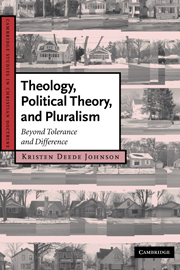6 - Conclusion
Published online by Cambridge University Press: 22 September 2009
Summary
We have now reached the end of a rather long journey, one that has wound its way through different theories, practices, and ontologies in an effort to explore some of the pictures and possibilities available to a pluralist society composed of a multitude of differences. This journey has carried us from liberal tolerance to a post-Nietzschean celebration of difference to a Christian hope for the harmonization of differences in the Heavenly City. It has taken us from theory determined to avoid reliance on controversial assumptions to theory that draws attention to the ontological assumptions at play within every position to theology that offers its own contestable ontology as one that might help the Church navigate the tricky waters of pluralism, tolerance, and difference at the same time as it helps to augment our current political imagination. For our imagination today is impoverished, as indicated by the limited success we have had in picturing how to move beyond liberal tolerance, so that the particularity of differences can be recognized, and beyond the agonistic veneration of difference, so that differences can be harmonized without being muted or silenced.
Every theory relies upon an ontology that is held as a matter of faith, either implicitly or explicitly invoking deep beliefs about the nature of reality and human being. Political liberalism is undergirded by an ontology that prioritizes the universal over the particular, post-Nietzschean political theory and radical democracy by an ontology that celebrates diversity at the cost of unity.
- Type
- Chapter
- Information
- Theology, Political Theory, and PluralismBeyond Tolerance and Difference, pp. 250 - 260Publisher: Cambridge University PressPrint publication year: 2007

